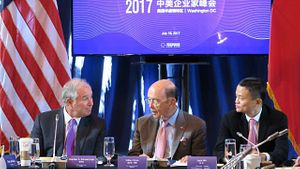The first U.S.-China Business Leaders Summit was held at the U.S. Department of Commerce in Washington, D.C., on July 18th. The founder of Alibaba Group, Jack Ma, and the CEO of Blackstone Group, Stephen Schwarzman, co-chaired the summit. Under the theme of “Promoting table Sino-US Economic and Trade Relations”, 20 business tycoons from both China and the United States came for the one-day closed-door dialogue. The U.S. Commerce Secretary Wilbur Ross attended the summit too.
Despite the fact that Schwarzman and Ma issued a joint statement at the conclusion of the summit, according to several sources who attended the Summit, both sides, which held many differing views, did not really achieve much during the closed-door talk. The Summit was more like a show.
However, the effect of a show is actually what the Summit aimed to achieve.
In fact, no one would really reasonably expect that any material outcomes could be realized during the one-day talk. The Chinese side knew this, and the U.S. side knew it, too.
Then why did the group of business tycoons still make the effort to attend?
Perhaps they too saw the value in a show.
For Jack Ma, he might be the biggest beneficiary of the show.
According to sources mentioned above, Ma’s team had promoted the summit to multiple Chinese media outlets a long time before the actual engagement.
On the morning of July 18, as a large number of media outlets, mostly Chinese ones, gathered in the U.S. Department of Commerce, Ma, sitting on the left hand of Wilbur Ross, delivered a bilingual speech in English and Chinese.
Contrary to the this week’s “Made in America”theme launched by U.S. President Donald Trump this Monday, Ma claimed: “Over the past decades, our two countries have advanced far past a simple trading and investment relationship. It is much more than “made in America” or “made in China.”
His speech, as well as the fact that he co-chaired the summit, once again demonstrated that Ma, the richest man in China currently, is seen as the leader of Chinese business community now; no one else in China is more capable of representing Chinese business leaders.
For Wilbur Ross, he also benefited from the summit.
His Ministry of Commerce under the Trump administration has been criticized by naysayers for anti-free trade practices and promoting an isolationist U.S. mindset. By attending the summit, he showed that he not only does not oppose trade or investment, but welcomes and encourages dialogue in these fields.
However, Ross didn’t soften his position either. Though he did tell the dialogue that all companies would be strengthened because of development of U.S.-China relations, he also emphasized the the imbalance of US-China trade should be reviewed. By adopting this more balanced approach, Ross might be able to temporarily silence criticism from both sides.
For business leaders from both countries, though the talk didn’t achieve much, what it did achieve fit well with their own modest objectives. The only goals on their agenda were to know more people, gain more publicity and explore more opportunities.
As the attendees list shows, the 20 business tycoons were all prominent leaders in various sectors. Any small discussions during the meeting might lead to big investments in the future. In that sense, the summit achieved all the business leaders (modest) goals.
Thus, it might be fair to say that the summit was a typical “win-win” meeting as the Chinese like to describe it. It might be a show, but that is the goal.
Charlotte Gao holds a MA degree in Asian Studies. Her research interests center around East Asian topics. She has worked in the past as a news editor, reporter, and writer for multiple traditional, online, and new media outlets.































